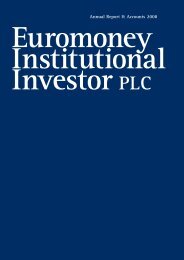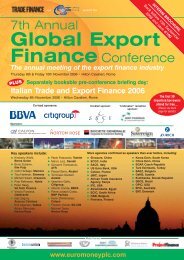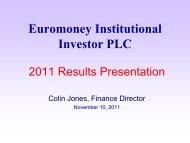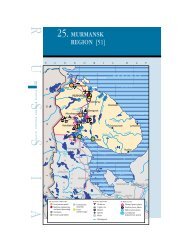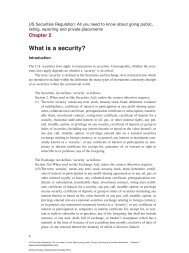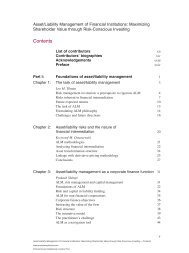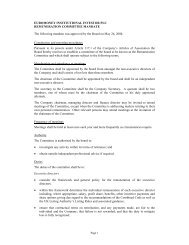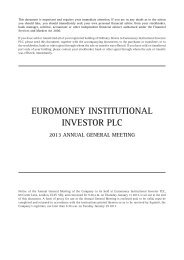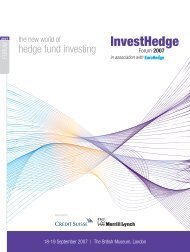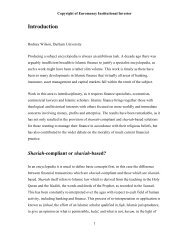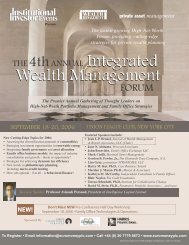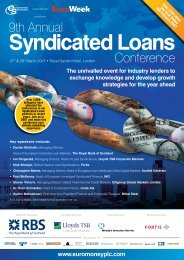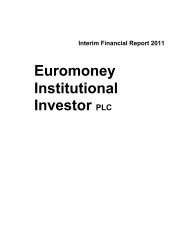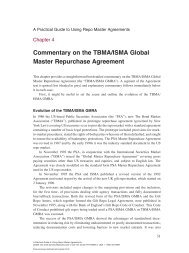Annual Report & Accounts 2012 - Euromoney Institutional Investor ...
Annual Report & Accounts 2012 - Euromoney Institutional Investor ...
Annual Report & Accounts 2012 - Euromoney Institutional Investor ...
Create successful ePaper yourself
Turn your PDF publications into a flip-book with our unique Google optimized e-Paper software.
<strong>Euromoney</strong> <strong>Institutional</strong> <strong>Investor</strong> PLC <strong>Annual</strong> <strong>Report</strong> and <strong>Accounts</strong> <strong>2012</strong><br />
www.euromoneyplc.com<br />
Directors’ Remuneration <strong>Report</strong><br />
Introduction<br />
This Remuneration <strong>Report</strong> sets out the group’s<br />
policy and structure for the remuneration of<br />
executive and non-executive directors together<br />
with details of directors’ remuneration packages<br />
and service contracts. The report has been<br />
prepared in accordance with Schedule 8 (Quoted<br />
Companies: Directors’ Remuneration <strong>Report</strong>) to<br />
the Large and Medium-sized Companies and<br />
Groups (<strong>Accounts</strong> and <strong>Report</strong>s) Regulations<br />
2008 and shareholders will be invited to approve<br />
this report at the <strong>Annual</strong> General Meeting on<br />
January 31 2013.<br />
Remuneration committee<br />
During the year the remuneration committee<br />
comprised JC Botts (chairman), MWH Morgan,<br />
and DP Pritchard (independent). All members of<br />
the committee are non-executive directors of<br />
the company. MWH Morgan is also a director of<br />
Daily Mail and General Trust plc (DMGT) but has<br />
no personal financial interests in the company<br />
(other than as a shareholder), and no day-to-day<br />
involvement in running the business. For the year<br />
under review, the committee also sought advice<br />
and information from the company’s chairman,<br />
managing director and finance director. The<br />
committee’s terms of reference permit its<br />
members to obtain professional external advice<br />
on any matter, at the company’s expense, and<br />
they did so in <strong>2012</strong> as part of the independent<br />
executive search process undertaken in<br />
connection with the succession planning for the<br />
company’s chairman. The group itself can use<br />
external advice and information in preparing<br />
proposals for the remuneration committee. It<br />
does apply external benchmarking although<br />
no material assistance from a single source was<br />
received in <strong>2012</strong>.<br />
Remuneration policy<br />
The group believes in aligning the interests<br />
of management with those of shareholders.<br />
It is the group’s policy to construct executive<br />
remuneration packages such that a significant<br />
part of a director’s compensation is based on<br />
the growth in the group’s profits contributed<br />
by that director. The two consistent objectives<br />
in its remuneration policy since the company’s<br />
inception in 1969 have been the maximisation<br />
of earnings per share and the creation of<br />
shareholder value.<br />
Maximising earnings per share<br />
The first objective is achieved through a profit<br />
sharing scheme that links the pay of executive<br />
directors and key managers to the growth in<br />
profits of the group or relevant parts of the<br />
group. This scheme is completely variable with<br />
no guaranteed floor and no ceiling. All those<br />
on profit shares are aware that if profits rise, so<br />
does their pay. Similarly if profits fall, so do their<br />
profit shares.<br />
To support the policy of profit sharing, the<br />
group is divided into approximately 100 profit<br />
centres. The manager of each profit centre is<br />
paid a profit share based on the profit centre’s<br />
profit growth. Each profit centre is in turn part<br />
of a larger business unit and each business<br />
unit manager or executive director has a profit<br />
share based on the unit’s profit growth. The<br />
profit sharing scheme is closely aligned with the<br />
group’s strategy in that it encourages managers<br />
and directors to grow their businesses, to<br />
manage costs tightly, to launch new products<br />
and to search for acquisitions.<br />
Creating shareholder value<br />
The second objective is encouraged through the<br />
Capital Appreciation Plan (CAP).<br />
The CAP is a highly geared performancebased<br />
share option scheme which both directly<br />
rewards executives for the growth in profits of<br />
the businesses they manage, and links this to<br />
the delivery of shareholder value by satisfying<br />
rewards in a mix of shares in the company and<br />
cash. The current CAP, CAP 2010, aims to mirror<br />
the success of CAP 2004 for both shareholders<br />
and management by delivering exceptional<br />
profit growth over the performance period.<br />
Further details of CAP 2004 and CAP 2010 are<br />
set out on pages 42 to 44.<br />
The company also has an executive share option<br />
scheme which was approved by shareholders in<br />
January 1996. The performance criteria under<br />
which options granted under this scheme may<br />
be exercised are set out on page 44. This scheme<br />
expired in 2006, and no options have been<br />
issued under it since February 2004 although<br />
options previously granted may be exercised<br />
before various dates to February 2014.<br />
The directors believe that these profit sharing and<br />
share option arrangements are responsible for<br />
much of the company’s success since 1969. These<br />
arrangements align the interests of the directors<br />
and managers with those of shareholders and are<br />
considered an important driver of the company’s<br />
growth.<br />
Detailed remuneration<br />
arrangements of executive<br />
directors<br />
Base salary and benefits<br />
The base salary and benefits is generally not<br />
the most significant part of a director’s overall<br />
compensation package, and variable profit<br />
share makes up much of their total pay. For<br />
example, of the total remuneration of the nine<br />
executive directors who served in the year,<br />
89% was derived from variable profit shares, as<br />
illustrated in the following table:<br />
Fixed<br />
salary &<br />
benefits<br />
Variable<br />
profit<br />
share<br />
PM Fallon<br />
(died October 14 <strong>2012</strong>) 4% 96%<br />
PR Ensor 4% 96%<br />
NF Osborn 30% 70%<br />
DC Cohen 26% 74%<br />
CR Jones 29% 71%<br />
DE Alfano 19% 81%<br />
CHC Fordham 17% 83%<br />
JL Wilkinson 62% 38%<br />
B AL-Rehany 26% 74%<br />
Total 11% 89%<br />
Directors’ Remuneration <strong>Report</strong><br />
Company <strong>Accounts</strong> Group <strong>Accounts</strong> Our Governance<br />
Our Performance<br />
41



